
Texts under Consideration:
 The vice president of the World Bank has
pronounced, "The wars of the next century will be about water." Increasingly,
transnational corporations are plotting to control the world's
dwindling water supply. In England and France, where water has
already been privatized, rates have soared and water shortages
have been severe. The major bottled-water companies--Perrier, Evian,
Naya, and now Coca-Cola and PepsiCo--head one of the fastest growing
and least regulated industries, buying up fresh water rights and
drying up crucial reserves. The consumption of water doubles
every twenty years--more than twice the rate of the increase in
human population. This book captures in striking detail the forces
behind the depletion of the world's fresh water, and the human
and ecological impacts it entails. The vice president of the World Bank has
pronounced, "The wars of the next century will be about water." Increasingly,
transnational corporations are plotting to control the world's
dwindling water supply. In England and France, where water has
already been privatized, rates have soared and water shortages
have been severe. The major bottled-water companies--Perrier, Evian,
Naya, and now Coca-Cola and PepsiCo--head one of the fastest growing
and least regulated industries, buying up fresh water rights and
drying up crucial reserves. The consumption of water doubles
every twenty years--more than twice the rate of the increase in
human population. This book captures in striking detail the forces
behind the depletion of the world's fresh water, and the human
and ecological impacts it entails. |
 David Goodstein, the vice provost
and professor of physics at Caltech, explains the underlying scientific
principles of the inevitable fossil fuel crisis we face, and the
closely related peril to the Earth's climate. America's
military and industrial might arose largely from the fact that
it was the world's leading producer of oil, a geophysicists named
M. King Hubbert, realizing that the discovery peak had already
passed, predicted that oil production in the Lower 48 would reach
its highest point around 1970 and would decrease rapidly after
that. Now a number of petroleum geologists have pointed
out that worldwide discovery of oil peaked decades ago. As oil
fields continue to be depleted and new discovery, including advances
in oil technology, fails to keep up, the prospect of a global Hubbert's
peak looms before us. David Goodstein, the vice provost
and professor of physics at Caltech, explains the underlying scientific
principles of the inevitable fossil fuel crisis we face, and the
closely related peril to the Earth's climate. America's
military and industrial might arose largely from the fact that
it was the world's leading producer of oil, a geophysicists named
M. King Hubbert, realizing that the discovery peak had already
passed, predicted that oil production in the Lower 48 would reach
its highest point around 1970 and would decrease rapidly after
that. Now a number of petroleum geologists have pointed
out that worldwide discovery of oil peaked decades ago. As oil
fields continue to be depleted and new discovery, including advances
in oil technology, fails to keep up, the prospect of a global Hubbert's
peak looms before us. |
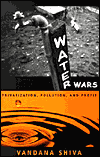 Vandana Shiva, "the world's
most prominent radical scientist" (the Guardian) and the recipient
of the Right Livelihood Award , the alternative Nobel Prize, exposes
yet another corporate maneuver to convert a critical world resource
into a profitable commodity. Using the global water trade as a
lens, she highlights the destruction of the earth and the disenfranchisement
of the world's poor as they lose their right to a life-sustaining
common good. Vandana Shiva, "the world's
most prominent radical scientist" (the Guardian) and the recipient
of the Right Livelihood Award , the alternative Nobel Prize, exposes
yet another corporate maneuver to convert a critical world resource
into a profitable commodity. Using the global water trade as a
lens, she highlights the destruction of the earth and the disenfranchisement
of the world's poor as they lose their right to a life-sustaining
common good. |
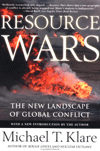 In
the early decades of the new millennium, wars will be fought not
over ideology but over access to dwindling supplies of precious
natural commodities. The political divisions of the Cold War, Klare
asserts, have given way to a global scramble for oil, natural gas,
minerals, and water. And as armies throughout the world define
resource security as a primary objective, widespread instability
is bound to follow, especially in those areas where competition
for essential materials overlaps with long-standing territorial
and religious disputes. Resource Wars is a compelling look at warfare
in an era of rampant globalization and intense economic competition. In
the early decades of the new millennium, wars will be fought not
over ideology but over access to dwindling supplies of precious
natural commodities. The political divisions of the Cold War, Klare
asserts, have given way to a global scramble for oil, natural gas,
minerals, and water. And as armies throughout the world define
resource security as a primary objective, widespread instability
is bound to follow, especially in those areas where competition
for essential materials overlaps with long-standing territorial
and religious disputes. Resource Wars is a compelling look at warfare
in an era of rampant globalization and intense economic competition. |
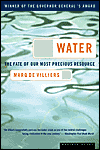 Marq de Villiers provides an eye-opening
account of how we are using, misusing, and abusing our planet's
most vital resource. Encompassing ecological, historical, and cultural
perspectives, de Villiers reports from hot spots as diverse as
China, Las Vegas, and the Middle East, where swelling populations
and unchecked development have stressed fresh water supplies nearly
beyond remedy. Political struggles for control of water rage around
the globe, and rampant pollution daily poses dire ecological threats.
With one eye on these looming crises and the other on the history
of our dependence on our planet's most precious commodity, de Villiers
has crafted a powerful narrative about the lifeblood of civilizations. Marq de Villiers provides an eye-opening
account of how we are using, misusing, and abusing our planet's
most vital resource. Encompassing ecological, historical, and cultural
perspectives, de Villiers reports from hot spots as diverse as
China, Las Vegas, and the Middle East, where swelling populations
and unchecked development have stressed fresh water supplies nearly
beyond remedy. Political struggles for control of water rage around
the globe, and rampant pollution daily poses dire ecological threats.
With one eye on these looming crises and the other on the history
of our dependence on our planet's most precious commodity, de Villiers
has crafted a powerful narrative about the lifeblood of civilizations. |
 With 50 percent of the world's landmass covered
by shared river basins, competition over water resources has always
had the potential to spark violence. And the burgeoning populations
and fast-developing industries of today's Third World are putting
ever greater pressures on already scarce water resources. Elhance
explores the hydropolitics of six of the world's largest and most
turbulent river basins: the Parana-La Plata Basin; the Nile Basin;
the Jordan River; the Euphrates-Tigris Basin; the Ganges-Brahmaputra-Barak
Basin; and the Mekong Basin. In each case, he examines the basin's
physical, economic, and political geography; the possibilities
for acute conflict; and efforts to develop bilateral and multilateral
agreements for sharing water resources. With 50 percent of the world's landmass covered
by shared river basins, competition over water resources has always
had the potential to spark violence. And the burgeoning populations
and fast-developing industries of today's Third World are putting
ever greater pressures on already scarce water resources. Elhance
explores the hydropolitics of six of the world's largest and most
turbulent river basins: the Parana-La Plata Basin; the Nile Basin;
the Jordan River; the Euphrates-Tigris Basin; the Ganges-Brahmaputra-Barak
Basin; and the Mekong Basin. In each case, he examines the basin's
physical, economic, and political geography; the possibilities
for acute conflict; and efforts to develop bilateral and multilateral
agreements for sharing water resources. |
 Richard Heinberg places this momentous transition
in historical context, showing how industrialism arose from the
harnessing of fossil fuels, how competition to control access to
oil shaped the geopolitics of the 20th century, and how contention
for dwindling energy resources in the 21st century will lead to
resource wars in the Middle East, Central Asia, and South America.
He describes the likely impacts of oil depletion, and all of the
energy alternatives. Richard Heinberg places this momentous transition
in historical context, showing how industrialism arose from the
harnessing of fossil fuels, how competition to control access to
oil shaped the geopolitics of the 20th century, and how contention
for dwindling energy resources in the 21st century will lead to
resource wars in the Middle East, Central Asia, and South America.
He describes the likely impacts of oil depletion, and all of the
energy alternatives. |
 Six
studies focus on the availability of water as a constraint on development
and water scarcity as a source of international conflict. Scholars
of hydrology, international relations, development, conflict resolution,
and anthropology address the issues in the context of the shortage
of fresh water steadily expanding from the southern to the northern
hemisphere. The six case studies are The
Nile: Source of Life, Source of Conlfict, Water
and the Arab-Israeli Conflict, Turkey,
Syria and Iraq: A Hydropolitical Security, India:
The Domestic and International Politics, Mainland
Southeast Asia: Co-operation or Conflict, Looming
Water Crisis: New Approaches. Six
studies focus on the availability of water as a constraint on development
and water scarcity as a source of international conflict. Scholars
of hydrology, international relations, development, conflict resolution,
and anthropology address the issues in the context of the shortage
of fresh water steadily expanding from the southern to the northern
hemisphere. The six case studies are The
Nile: Source of Life, Source of Conlfict, Water
and the Arab-Israeli Conflict, Turkey,
Syria and Iraq: A Hydropolitical Security, India:
The Domestic and International Politics, Mainland
Southeast Asia: Co-operation or Conflict, Looming
Water Crisis: New Approaches. |
 Vaclav Smil considers the twenty-first century's
crucial question: How to reconcile the modern world's unceasing
demand for energy with the absolute necessity to preserve the integrity
of the biosphere. After a century of unprecedented production growth,
technical innovation, and expanded consumption, the world faces
a number of critical energy challenges arising from unequal resource
distribution, changing demand patterns, and environmental limitations.
His fundamental message is that our dependence on fossil fuels
must be reduced not because of any imminent resource shortages
but because the widespread burning of oil, coal, and natural gas
damages the biosphere and presents increasing economic and security
problems as the world relies on more expensive supplies and Middle
Eastern crude oil. Vaclav Smil considers the twenty-first century's
crucial question: How to reconcile the modern world's unceasing
demand for energy with the absolute necessity to preserve the integrity
of the biosphere. After a century of unprecedented production growth,
technical innovation, and expanded consumption, the world faces
a number of critical energy challenges arising from unequal resource
distribution, changing demand patterns, and environmental limitations.
His fundamental message is that our dependence on fossil fuels
must be reduced not because of any imminent resource shortages
but because the widespread burning of oil, coal, and natural gas
damages the biosphere and presents increasing economic and security
problems as the world relies on more expensive supplies and Middle
Eastern crude oil. |
 Winner of the 1992 Pulitzer Prize for nonfiction,
The Prize is a comprehensive history of one of the commodities
that powers the world - oil. Founded in the 19th century, the oil
industry began producing kerosene for lamps and progressed to gasoline.
Huge personal fortunes arose from it, and whole nations sprung
out of the power politics of the oil wells. Yergin's fascinating
account sweeps from early robber barons like John D. Rockefeller,
to the oil crisis of the 1970s, through to the Gulf War. Winner of the 1992 Pulitzer Prize for nonfiction,
The Prize is a comprehensive history of one of the commodities
that powers the world - oil. Founded in the 19th century, the oil
industry began producing kerosene for lamps and progressed to gasoline.
Huge personal fortunes arose from it, and whole nations sprung
out of the power politics of the oil wells. Yergin's fascinating
account sweeps from early robber barons like John D. Rockefeller,
to the oil crisis of the 1970s, through to the Gulf War. |
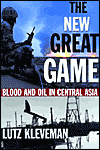 Lutz Kleveman has crafted a modern variant of
the 19 th century clash of imperial ambitions of Great Britain
and czarist Russia. Only this time the stakes are higher. Desperate
to wean itself from dependence on the powerful OPEC cartel, the
United States is now pitted in a struggle against Russia and China,
as all three nations compete for dominance in the Caspian region
and access to its resources and pipeline routes. Complicating the
playing field are transnational energy corporations with their
own agendas and brash new entrepreneurs who have taken control
after the collapse of the Soviet Union. Lutz Kleveman has crafted a modern variant of
the 19 th century clash of imperial ambitions of Great Britain
and czarist Russia. Only this time the stakes are higher. Desperate
to wean itself from dependence on the powerful OPEC cartel, the
United States is now pitted in a struggle against Russia and China,
as all three nations compete for dominance in the Caspian region
and access to its resources and pipeline routes. Complicating the
playing field are transnational energy corporations with their
own agendas and brash new entrepreneurs who have taken control
after the collapse of the Soviet Union. |
 Halliburton and its subsidiaries form the foundation of an intriguing story of
cronyism and conflict of interest that has only increased in momentum over
the last decade. Award-winning journalist Dan Briody cuts through the veil
of secrecy that cloaks this controversial company, and reveals how the confluence
of business and politics has led to questionable deals as well as financial
windfalls for Halliburton and its executives. Halliburton and its subsidiaries form the foundation of an intriguing story of
cronyism and conflict of interest that has only increased in momentum over
the last decade. Award-winning journalist Dan Briody cuts through the veil
of secrecy that cloaks this controversial company, and reveals how the confluence
of business and politics has led to questionable deals as well as financial
windfalls for Halliburton and its executives. |
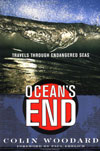 In this landmark call to action, Colin Woodard
confronts the major environmental problem of our time: the fate
of the oceans. Once thought to be limitless reservoirs constantly
renewing themselves, the oceans are in fact bounded seas that lie
within our power to kill-and as Woodard convincingly shows, we
are killing them, through pollution, harmful fishing practices,
ignorance, and global warming. In this landmark call to action, Colin Woodard
confronts the major environmental problem of our time: the fate
of the oceans. Once thought to be limitless reservoirs constantly
renewing themselves, the oceans are in fact bounded seas that lie
within our power to kill-and as Woodard convincingly shows, we
are killing them, through pollution, harmful fishing practices,
ignorance, and global warming. |